CTI intro Eng - Chiesa Taoista d'Italia
Menu principale:
- Home Page
- Storia 来历
- Prefetto 会长
- Taoismo
- Dialogo Interreligioso
-
Articoli
- Taoismo e Mondo Digitale
- Pratica interiore taoista e apertura multidimensionale
- I Tre Tesori Taoisti che possono salvare l'umanità
- Tornare alla radice per giungere all’Eterno
- Tao precede Dio
- La scelta religiosa taoista
- Fu 符_Il Sigillo del Comando
- Wai Riong Jing_le origini dell'etica taoista
- Le 3 Vie
- Fraintendimenti sul Taoismo
- Diffidate dei "maestri solitari"
- La Religione e la cura della Casa Comune
- Tao - Il Mistero dei Misteri
- San Francesco e Wang Chongyang
- Tao Snacks
- Guida alla pratica quotidiana
- Scienza e religione
- Siamo UNO
- Dao o Tao?
- La figura del monaco nel Taoismo
- Il Saluto Taoista
- Jiao Bei comunicare con gli Dei.
- La mia gentilezza
- Intervista a New Bushido
- Sii Acqua
- Sono Taoista - Felice di esserlo
- I figli: atto d’Amore o d’Egoismo?
- Attività
- Accademia
- Adesione
CTI intro Eng
The C.T.I. in a glance
Note: What is written on this home page, dated 12/26/2014, is the intellectual property of the Taoist Church of Italy. It may not be reproduced, partial and / or total, without written permission. We reserve all rights of protection by legal action.
About Us
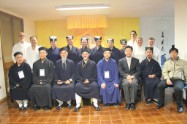
The Taoist Church of Italy, 意大利 道教 会 (C.T.I.), is the only Confessional Religious Taoist body legally constituted and operating as such under the laws of the Italian State.
It has a history of over twenty years of activity and promotion of the Taoism.
Despite having a direct preferential channel with the Chinese Taoist Association, collaborates with other international organizations to spread the Taoism worldwide.
Link: 1. History 2. 3. Activities 4. World Wide Daoist Day
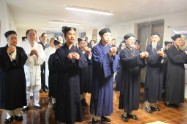


Our mission
The purposes of C.T.I. are the same of Taoism consisting, first of all, in respect the Three Laws:
1. The Law of the Tao,
2. The Law of Nature
3. The Law of Human.
In particular the Articles 3 and 4 of our Constitution expresses our purpose:
The C.T.I., moving from the assumption that human is a spiritual being that animates a physical body, and therefore is able to grasp the dimension of divine and the sacred, it has as main purpose the direct exercise of Taoist worship, the care of souls, the formation of the clergy and religious missionaries and catechesis purposes.
The C.T.I., promotes and supports the interreligious dialogue, the respect of religious pluralism, to answer the needs of a multiethnic and multireligious society, and educate young people to respect and openness to others;
The C.T.I. is against any recourse to the use of force to resolve conflicts, personal and / or social;
The C.T.I. also will be the interlocutor and the bearer of the interests of its believers for relations with the Italian State, also aimed at achieving the Agreement pursuant to art. 8.3 of the Italian Constitution.
Link: interreligious dialogue


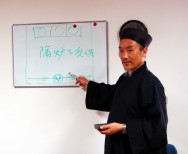
Traditions and Schools
(Dao Pai 道 派)
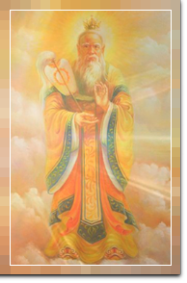
Taoism is a complex system, stratified over thousands of years.
Various traditions (cultural, spiritual and religious) of the great Chinese civilization, have contributed to its formation.
During its history has generated many schools (Pai 派), some of them gone by now, others still alive and flourishing.
The different currents have been focused on specific aspects of the doctrine and practice, despite having the same goal of the reunion with the Tao, thus creating an identity and a sense of belonging that are of primary importance for the spiritual genealogy of Taoist practitioners.
Wanting to make an analogy, you can think of different paths that all lead to a mountain top.
The C.T.I., according to its possibilities and with the necessary adaptations (especially pedagogical and didactical, to enable dialogue between the Western mindset and Taoism) tries to transmit the Culture and the Taoist religion but, at the same time, to safeguard the traditional teachings.
The C.T.I. does not promote a single Taoist Pai 派, but, with ecclesial spirit and universal approach, gives space and receives the various traditions. The choice of belonging to one school rather than another is left to the vocation of each believer.


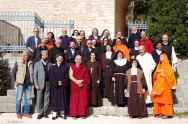
Approach to Taoism

People approach to Taoism, above all, for its vision of the world, as outlined in the three canonical texts: the Daode Jing, the Zhuangzi and the Liezi.
His philosophy of life can be summarized with three principles: Respect, Spontaneity and No-interference. In other words: respect nature, others and yourself; spontaneously, be who you are; act without force things to satisfy personal interests but leave them free to follow their natural course. Its ethics has three core values: Compassion, Humility and Frugality.
Following these principles will develop a personal and social mentality to live in harmony with ourselves and with the world around us.
The Taoist thought (Daojia 道家) is, however, only the tip of the Taoism iceberg (Daojiao 道教).
In fact it lacks the level of the sacred and the divine dimension (Shensheng 神圣), whose call is answered by the religious instinct, innate in every human being.
Those who want to go beyond the simple philosophy and, following their vocation, set out on a path of development and spiritual fulfillment, found in Taoism an initiatory path perfected in over 26 centuries and a Religion alive uninterruptedly for two thousand years.
The Daojiao and Daojia are not the two separate legs of Taoism but two steps which follow one another on the way, alternatively, the one after the other. They are the warp and woof of Taoism.
daojao
The first steps on
Taoism Spiritual Path
The human being is an indivisible unit and consists of three dimensions:
1. body
2. mind
3. spirit.
Taoism believes that human being is a microcosm mirror the macro-cosmos.
The human being knowing himself may come into contact with the cosmos, with the flux and the flowing of Tao.
How to make this happen even if at first glance seems a utopia?
Everything becomes clear if we look at the Taoism as a "Via Mistica" in which you try to go into resonance with the cosmic forces.
Taoism is a Initiation Path that takes care of human being as a whole, coexist the spiritual and the material life in perfect harmony.
In fact there are three purposes of Taoist spiritual practice (Xiudao 修道):
1. Having a healthy body
2. Pacifying and rendering pure the mind
3. Relating to the sacred
The first two are available to everyone because they are centered on the person.
There are practiced techniques to enhance health, calm the mind and awaken the spiritual consciousness.
The third, takes time, practice, study and, above all, a vocation, a call to the Divine and he religious Taoist practice.
For this reason the members of C.T.I. are divided into two categories: Novices and Initiates.
Novices (adherents to C.T.I.) do not take religious vows, but they choose to apply in their life an ethic regulated by Universal values (see ).
They follow a simple and effective method, based on meditation (Jingzuo 静坐) and energy balance (Daoyin 导引 and Yangsheng 養生), whose bases are learned in few hours.
Afterwards each novice is followed individually, maintaining continuous contact to perfect the practice.
Initiates (members of the C.T.I.) follow the courses of ecclesiastical training at the Academy of Advanced Taoist Education and take religious vows.
daojao
Receive the Tao
(Chuan Dao Yishi传道 仪式)
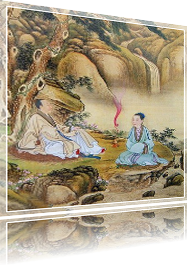
Taoism is an initiatic path that is the "Way of Initiates", people to who were transmitted the "spiritual and religious mysteries" by others who have received them before them, and so on, going back a centuries old genealogy.
The term "initiation" identifies the beginning of an inner journey and is a necessary and solemn step because it contains aspects of "filiation" and "affiliation".
The only way to become a part of the Taoist Family is to be accepted by a master.
No wonder the above. In fact, any trip needs a guide who leads on safe paths, avoid, thanks to his experience and knowledge, the inevitable dangers along the way.
Basically if you think about it, you can play the piano by ear but if you want to be musician, you have to follow the teachings of an experienced teacher, practicing daily and to atend the conservatory. This is infinitely more worth if we speak of a spiritual Path.
We use the term "family" because the master-disciple relationship is kind of parental and teaching takes place "from mouth to ear." For this reason the spiritual Taoist master is called by his disciples with the term of Shifu 师父, which means teacher-father. The disciples are defined Dizi 弟子, a term that has the meaning of young brother-son.
The ceremony of this first initiation is very simple. It marks the beginning of the apprenticeship or novitiate and the spiritual relationship between master and disciple.
The second initiation is the religious order itself.
It marks the transition from Dizi 弟子 to Daoshi 道士, from novice to ecclesiastical effective member.
For its solemnity and since it sets the affiliation to the Taoist family, it is officiated, normally, by a group of priests headed by a high prelate (Gaogong 高 功).
Follow Taoism without belonging to a spiritual and religious lineage, without "have received the Tao", without an initiation that breakouts, awakenings and active the inner potentials, forecloses access to spiritual power.
Initiations ignite the spiritual light (Ming 明) that otherwise would remain turned off and the dialogue relationship with the divinity would be impossible because it would lack a basic factor: the resonance with it (Ganying 感应).
Of course you can learn some techniques from books, from the internet or by self-qualified experts, but this scenario is like to possess all the pieces of a magnificent Ferrari which, even you, in the luckiest case, will be able to set up it correctly, you could never have the key to start the engine.
The initiation ceremonies of C.T.I. are always open to the public.
daojao
Taoists of C.T.I.

The Taoist Church of Italy is composed of women and men who live a normal life like everyone else. The only difference is that they have found their spiritual dimension in Taoism.
How do they know that are on the right track?
The answer is simple when you understand that:
Taoist Values give a sense and a direction to your life, to your way of being and to relate to others;
Through meditation, you feel in peace with yourself (Jing 静) and with the world (He 和);
You know you're part of a whole that speaks the same language because we come from the same origin, the Tao;
Thanks to the inner work, feel the vital energy (Qi 气) flow freely within you, without energy blocks, with beneficial effects on physical and mental health, in particular on the management of fear and control of desires;
Thanks to the daily religious practice (Baishen 拜神) you are able to experience the divine presence within and outside yourself and see that this divine power protects you always;
Thanks to Taoist filiation, you are immersed in an ocean of spiritual blessing energy that goes beyond the space-time but to which you can draw with filled hands;
You are welcomed as part of a large community of people (Daojiao Hui 道教 会) that have your same feeling, that does not give moral judgments, who help each other in friendship and mutual prosperity;
You can gain spiritual merit by helping others and improving society with your example of Taoist faith.
daojao
Supporting the CTI

The C.T.I. is a non-profit organization and is supported by the voluntary offerings of believers and by those who share our spiritual project for the benefit of Humanity.
Their generosity allows the Church to maintain the structure and promote the activities.
The C.T.I. believes that spiritual knowledge cannot be bought because it is priceless.
Its value resides only in the hearts of the Taoist devotees.
For this reason, anyone who wants to learn the basic techniques and receive the first initiation can do it for free.
Respond to the call that you feel within you and just ask to receive the Tao.
If you feel an affinity with the Taoist Spiritual path, help us to spread it.
Be actor and not a passive spectator of the change of your life.
A tiny flame can be enough to find the way back to the lost travelers.
The blessing of the Tao is the companion on your path and protects you always.
Links: 1. Donations 2. Contact C.T.I. 3. Registration form
Seguici su: